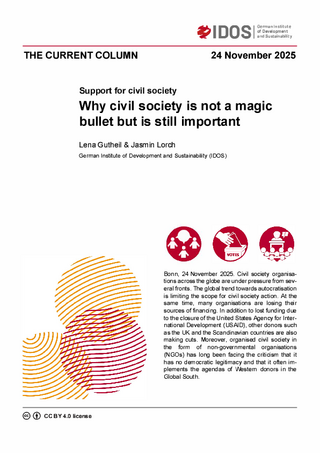Support for civil society
Why civil society is not a magic bullet but is still important
Gutheil, Lena / Jasmin LorchThe Current Column (2025)
Bonn: German Institute of Development and Sustainability (IDOS), The Current Column of 24 November 2025
Bonn, 24 November 2025. Civil society organisations across the globe are under pressure from several fronts. The global trend towards autocratisation is limiting the scope for civil society action. At the same time, many organisations are losing their sources of financing. In addition to lost funding due to the closure of the United States Agency for International Development (USAID), other donors such as the UK and the Scandinavian countries are also making cuts. Moreover, organised civil society in the form of non-governmental organisations (NGOs) has long been facing the criticism that it has no democratic legitimacy and that it often implements the agendas of Western donors in the Global South.
In the German context, cuts to the budget of the Federal Ministry for Economic Cooperation and Development (BMZ) are giving rise to the question of how to prioritise spending. Despite manifold challenges, funding for civil society should not be reduced but should instead be used in a targeted manner to protect democracy, because a strong civil society can certainly make important contributions in the fight against autocratisation.
A plea for realism
Since the 1990s, civil society organisations have often been idealised by Western donors. In many cases, civil society was equated with NGOs, which were seen as a kind of magic bullet not only in the promotion of democracy but also in providing social services. They were deemed to be particularly community-based and cost-effective.
Those times are gone. NGOs are not only being increasingly restricted by authoritarian governments; critical voices from their own ranks are also casting doubt on their effectiveness. NGOs working to promote democracy are being criticised for their lack of democratic legitimacy. Moreover, critics from the Global South are accusing NGOs of primarily implementing donor agendas. NGOs can also create new hierarchies by speaking ‘on behalf’ of marginalised groups – instead of empowering them to speak for themselves.
What civil society can do for democracy
One thing is clear: professional NGOs in the Global South are rarely member-based organisations and are not democratically elected. They cannot replace democratic parties. However, their strength lies in their ability to put specific issues on the political agenda. What they can really do well is put their finger on the sore spot in those sectors in which they have expertise.
NGOs use advocacy, lobbying and research to bring to public attention human rights violations and other problems such as environmental pollution. In doing so, they make important contributions to political opinion-forming and enhance the government’s transparency and accountability. In some countries such as Malawi and Senegal, mobilisation by NGOs has helped prevent political term limits from being lifted.
In cases where opposition parties are banned or restricted, NGOs make a limited but important contribution to political pluralism. In Cambodia’s authoritarian one-party regime, for example, workshops run by NGOs are now one of the few opportunities for citizens to discuss critical views.
At the same time, we need to open up our view of civil society. Recently, it has been the protests by the young generation (Gen Z) that have challenged autocratic or corrupt regimes in countries such as Madagascar, Kenya and Bangladesh. Social movements, trade unions and religious groups often exert considerable pressure for reform. These actors do not always talk the donors’ language – in both a literal and a figurative sense. Yet they are often better able to challenge authoritarian governments and have stronger roots in the community than professionalised NGOs.
Targeted support
Germany and other donors should therefore continue to promote civil society and provide the necessary funding. Particularly in times when budgets are tight, they should take a very close look at which goals the funding is supposed to achieve. The organisations most worthy of funding are those that call governments to account and that work to promote human rights, transparency and pluralism. We need to be realistic about what NGOs can achieve. Yet in those areas in which they help protect democracy in partner countries, German foreign and development policy should support their work. Moreover, other civil society actors that make key contributions to democracy, such as social movements, trade unions and informal groups, need to be given better access to funding and political support.



